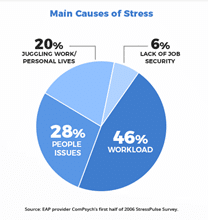Four Ways to Manage Stress and Anxiety in the Workplace for Overall Better Mental Health.

1. Reach Out to a Trusted Co-Worker or Supervisor
There is real power in seeking support from a co-worker or supervisor. Not only does it allow the thoughts to get out of your head, but it also creates space to better understand what’s causing the anxiety. You might be surprised that others are going through the same thing or that your boss is understanding of your feelings and willing to help you. You may have fear of what people might think of you or that your boss might look down on you for expressing these feelings. This is engaging in mindreading, meaning you never truly know how someone will react unless you talk to them. Our minds tend to go to the negative, but you might be surprised with the response and support given to you. Either way, you’re suffering. By not doing anything, you’ll get the same outcome, however by asking for support or guidance, it invites the possibility of a different outcome.
Years ago, I found myself really stressed out at a particular job. The job was pulling me in a million directions and to be honest, I had too much on my plate. I struggled for months and pushed off speaking with my boss because I was afraid she would think I couldn’t handle the position or I wasn’t a good enough job. When I finally went to her with my struggles, she offered nothing but support and the interaction went entirely different than what was built up in my head. I immediately felt better.
2. Understand What’s Causing the Anxiety
When your system is on overload day in and day out, you’re in survival mode. Your brain isn’t wired to differentiate what’s a real threat or sift through specific areas that are causing anxiety and stress. What ends up happening is you begin to feel that it’s all overwhelming and everything is stressful. Simply put you begin to feel stuck. By reflecting on the specifics of where your anxiety is coming from, you get a clearer picture on what needs to change. By understanding what might be causing the stress, you can start to feel less stuck and overwhelmed. If there are a few things, try ranking on a scale of 1-10 how stressful these situations are to you. Think about how they may be affecting you not only at work, but in your personal life as well.
In my situation above, it was easy to feel overwhelmed by everything about the job and frankly, it made me want to throw in the towel a lot of days. However, after talking to my boss, I pinpointed what was causing me the most stress. I genuinely liked the job and the people I worked with but working on multiple projects was pulling me in a million different directions. People were coming into my office and interrupting me, which pulled me away from the work and I was left feeling like I couldn’t get anything done.
3. Make Necessary Changes
After you’ve narrowed down what is causing you the most anxiety, you can form a plan to make realistic changes. For example, you may realize you like the actual job, but it’s your toxic co-worker that sits next to you that is causing your morale to dip. Try asking your boss if it would be possible to move desks. If it’s the workload, can your boss reassign a project to someone else? Remember, you are NOT a failure if you ask for help! This is where boundaries will play an important role. Once you have some ideas of how to make things better, hold yourself accountable to those changes.
In my case, after realizing most of my stress was coming from working on multiple projects and getting interrupted all the time, my boss and I worked out a plan for me to work from home on Fridays (this was pre-COVID). It ended up being a game changer – I was able to really focus on my work and be even more efficient at home. By working from home, I was able to accomplish more, adding more value to my company, and feel better personally. A win-win situation.
4. Evaluate if it’s Time to Go
Unfortunately, there are times when the job is simply too stressful or you’re not able to change things – and that’s OK, too. For example, if your boss isn’t able to provide you support around your workload, it may be time to go. Before quitting, ask yourself if this is a season or something chronic. Some industries or jobs are chronically stressful, while others go through cycles. What ever ends up happening, you’ll have more clarity and understanding about you as a person, what brings you stress and what you enjoy about work.
I didn’t end up having to leave my job, but small changes don’t always work out. Trust your gut and continue to be aware on how the job is impacting you, especially if it’s seeping into your personal life. By finding more clarity in what brings you anxiety at a job, you’ll be able to find a new job that doesn’t have these qualities and move forward without fear that you’re making the wrong decision.

Recent Comments